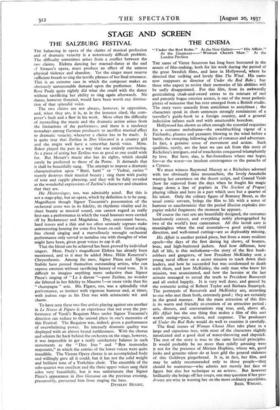THE CINEMA
" Under the Red Robe." At the New Gallery—" His Affair." At the Gaumont—" Woman Chases Man." At the London Pavilion
Tim name of Victor Seastrom has long been honoured in the annals of film-making,' both for his work' during the period of the great Swedish films, and later in Hollywood, where he directed that striking and lovely film The Wind. His name now reappears as director of Under the Red Robe ; but those who expect to revive their memories of his abilities will be sadly disappointed. For this film, from its awkwardly gesticulating cloak-and-sword extras to its mixture of real and patently bogus exterior scenes, is one of the most pathetic pieces of nonsense that has ever emerged from a British studio.
The story veers uneasily from anticlimax to anticlimax ; the characters speak in short sentences strongly reminiscent of a traveller's guide-book to a foreign country, and a general indecision infuses each reel with unutterable boredom.
Hollywood has shown us often enough the essential requisites for a costume melodrama—the swashbuckling vigour of a Fairbanks, plumes and pennants blowing in the wind before a battle, the sweeping, billowing skirts of romance and adventure. In fact, a genuine sense of movement and action. Such qualities, surely, are the least we can ask from this story of Richelieu's intrigues, and of treacheries conquered triumphantly by love. But here, alas, is flat-footedness where one hopes for—at the worst—an insolent extravagance or the panache of a Cyrano.
We must witness Raymond Massey as a Richelieu adorned with too obviously false moustachios, the lovely Annabella wasting her sweetness on the desert script, and Conrad Veidt (how far removed from the days when he fought his magic image down a line of poplars in The Student of Prague) playing villain and hero in a part which uses but a quarter of his talent. Only the solitary figure of Romney Brent, as the usual comic servant, brings the film to life with a sense of humour so anachronistic that the period illusion explodes into papier mache fragments the moment he appears. '
Of course the vast sets are beautifully designed, the costumes handsomely correct, and everything nobly photographed by two of the world's best cameramen. All this lavish care is meaningless when the real essentials—a good script, vivid direction, and well-timed cutting—are so deplorably missing.
His Affair is another period piece,. but from a more resilient epoch—the days of the first daring leg shows, of boaters, boas, and high-buttoned jackets. And how different, how full of life, is this melodrama—the story of the first bank- robbers and gangsters, of how President McKinley sent, a young naval officer on a secret mission to track down their leaders, and how he succeeded but was condemned to death with them, and how McKinley, the only man who knew his mission, was assassinated, and how the heroine at the last minute managed to reveal the truth to President Roosevelt and all ended happily. It is very well done, and graced by the romantic acting of Robert Taylor and Barbara Stanwyck The portrayals of Roosevelt and McKinley are, according to one who met them both, extremely good ; they are certainly in the grand manner. But the main attraction of this film is its warm and friendly re-creation of an attractive period ; sets, dresses, and conversations ring true, and, above all, His Affair has the one thing that makes a film of this sort worth seeing—pace, action, and suspense. The producers of Under the Red Robe would do well to examine it carefully.
The final scenes of Woman Chases Man take place in a large and capacious tree, with most of the characters slightly intoxicated and a good deal of water-throwing and slapstick. The rest of the story is true to the same farcical principles. It would probably be no more than mildly amusing were it not for the presence of Miriam Hopkins, whose wit, good looks and genuine talent do at least gild the general staleness of this Goldwyn gingerbread. It is, in fact, her film, and may be safely recommended only to those people—they should be numerous—who admire not merely her face or figure but also her technique as an actress. But however brilliantly she brings off her coups, one may question if her pro- (hirers are wise in wasting her on the more ordinary puerilities.
BASIL WRIGHT.






































 Previous page
Previous page